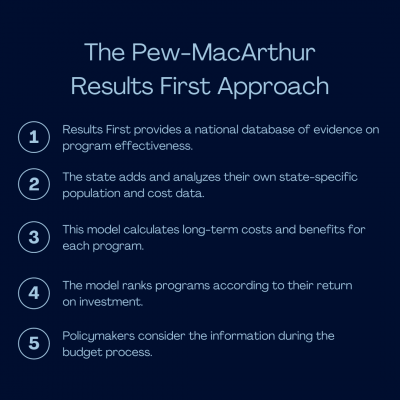
The Institute for Municipal and Regional Policy’s (IMRP) Pew-MacArthur Results First Initiative (Results First) works with jurisdictions to implement evidence-based policymaking approach and cost-benefit analysis model. This collaboration has helped jurisdictions invest their limited resources in policies and programs based on probable outcomes and return on investment. The intention is to produce better outcomes and substantial long-term savings.
Results First currently offers technical assistance to 16 states to customize and implement jurisdiction-specific versions of Washington State Institute for Public Policy (WSIPP) econometric model. The model analyzes the costs and benefits of evidence-based programs across a variety of social policy areas including:
(1) adult criminal justice (16 states)
(2) juvenile justice (five states)
(3) child welfare (three states)
(4) education (two states)
and (5) substance abuse and mental health (one state).
Connecticut became an early participant in the Initiative in 2011, and IMRP received a grant in 2015 to assist in the “development of the Connecticut specific model within the Pew-MacArthur Results First Initiative.”
The budget “implementer,” An Act Implementing Provisions of the State Budget for the Biennium Ending June 30, 2015 Concerning General Government (PA 13-247, Section 42) (see Appendix A), established a Results First Policy Oversight Committee (RFPOC) to provide advice on the development and implementation of the Pew-MacArthur Results First Initiative cost-benefit analysis model. The committee’s overall goal is to promote cost-effective state policies and programs.
Public Act 13-247 also required evaluations of domestic violence treatment programs funded by the Judicial Branch’s Court Support Services Division (CSSD) and the Department of Correction (DOC) for family violence offenders. The studies were required to “consider findings from the Pew-MacArthur Results First Initiative’s cost-benefit analysis model with respect to such programs.” After conducting these assessments, the agencies had to determine whether any program changes should be implemented to improve their cost-effectiveness.
In the 2018-2019 biennial budget document (PA 17-2), the Connecticut General Assembly expanded the Results First work to all state human service agencies in CT.
IMRP Project Staff includes Andrew Clark and Maddie Hart (UConn DPP intern).